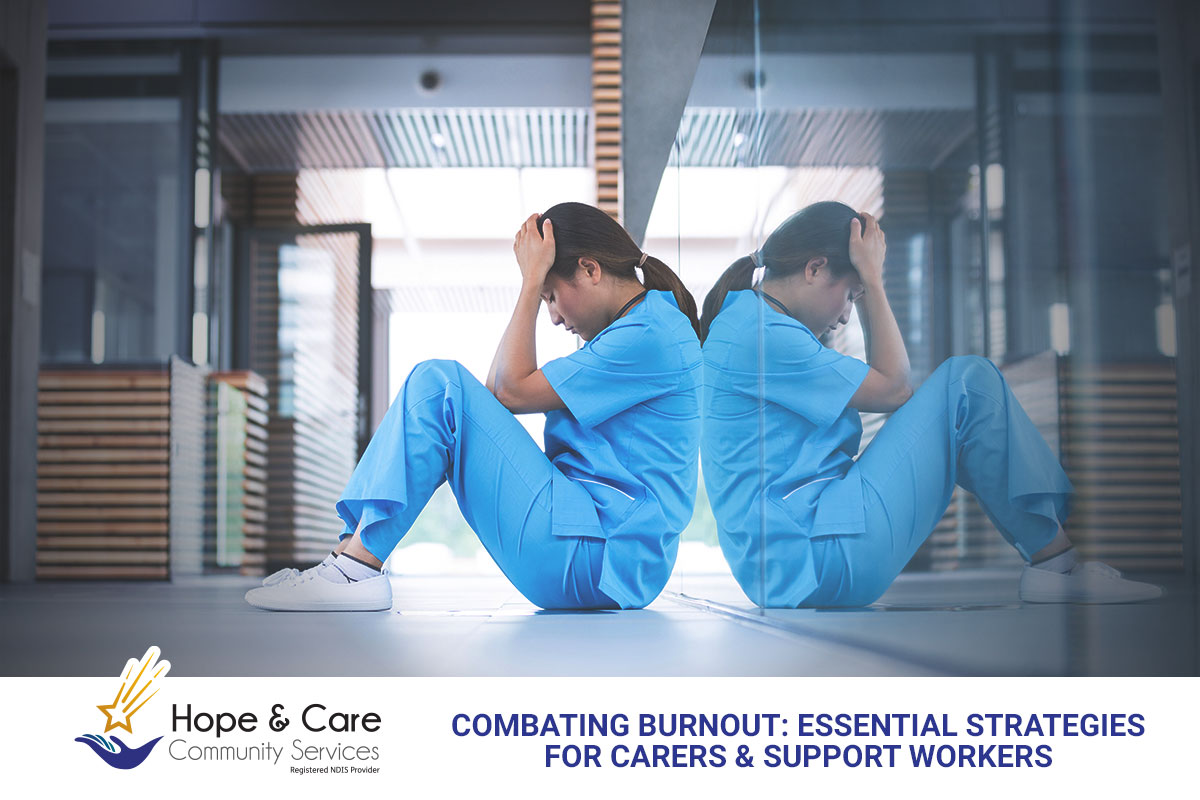
In Australia’s growing disability and community care sector, carers and support workers play a critical role in delivering compassionate, life-changing support. From personal care to emotional guidance, these professionals ensure people with disability live safer, more independent lives.
However, while the focus often remains on participants’ needs, the emotional, physical and mental demands of care work can place a heavy burden on the carers themselves. Over time, this can lead to burnout a serious condition that affects a worker’s health, wellbeing and ability to continue supporting others.
In this guide, we explore the causes and signs of burnout and share practical, evidence-based strategies to prevent and manage it in the disability support field.
What Is Burnout in Disability and Aged Care?
Burnout refers to chronic physical and emotional exhaustion caused by prolonged stress, especially in high-demand environments. In the disability support sector, burnout often occurs when workers:
- Manage heavy caseloads
- Work long hours without adequate breaks
- Face emotional pressure from participants’ needs
- Feel underappreciated or unsupported in their roles
Burnout affects both full-time and casual workers and is common in NDIS support services, aged care and home care settings. Recognising and addressing it early is essential for maintaining workforce wellbeing and delivering high-quality care.
Common Signs of Burnout
To respond effectively, carers and support workers need to identify the early signs of burnout. These may include:
- Persistent fatigue, even after rest
- Frequent headaches or physical tension
- Emotional numbness or detachment
- Feeling overwhelmed or irritable
- Decreased motivation or job satisfaction
- Difficulty focusing or completing tasks
These symptoms can worsen if ignored, leading to mental health issues, increased absenteeism and high staff turnover across disability care services.
Practical Strategies to Prevent and Manage Burnout
While burnout can feel overwhelming, carers and support workers can take proactive steps to improve their wellbeing. Here are key strategies that can make a meaningful difference:
Prioritise Self-Care
Maintaining personal health is not selfish it is essential. When carers invest in their own wellbeing, they improve both their mental resilience and the quality of support they provide.
Focus on:
- Daily movement or light exercise
- Nutritious, balanced meals
- Regular sleep and rest routines
- Hobbies and activities that bring joy
- Scheduled time away from work to unwind
Taking breaks throughout the day and engaging in enjoyable activities can help recharge your energy and improve your overall mood.
Seek Professional and Peer Support
Support workers do not have to manage stress alone. Reaching out can ease emotional burdens and provide new perspectives.
Consider:
- Talking to a supervisor or team leader
- Accessing mental health professionals
- Using Employee Assistance Programs (EAPs)
- Joining peer support groups or carer networks
Connecting with people who understand your challenges can make you feel heard, validated and less isolated.
Set Healthy Boundaries
Creating clear boundaries between work and personal life is key to avoiding long-term fatigue. You can do this by:
- Limiting overtime and avoiding double shifts
- Taking allocated lunch and rest breaks
- Saying “no” when workloads are too high
- Keeping work discussions out of personal time
Healthy boundaries protect your mental space and help prevent emotional exhaustion.
Use Mindfulness and Stress-Relief Tools
Simple stress-management tools like mindfulness, breathing exercises and guided meditation can offer calm during high-pressure moments.
Try:
- Deep breathing between appointments
- Journaling or reflection at the end of each shift
- Walking outside during breaks
- Listening to calming music after work
These practices reduce anxiety and improve emotional clarity, especially for carers in complex support environments.
Engage in Career and Skills Development
Sometimes, burnout results from a lack of progression or meaning. By investing in your professional growth, you can rediscover your purpose and improve confidence.
You can:
- Attend NDIS training workshops
- Explore career development pathways
- Join webinars or conferences
- Take short courses in mental health, behaviour support or leadership
Learning keeps you motivated, competent and connected to your career goals.
What Employers and NDIS Providers Can Do to Reduce Burnout
Support workers need more than individual strategies. Employers and NDIS providers in Australia must create workplaces that prioritise staff wellbeing and prevent burnout through systemic changes.
Manage Workloads and Scheduling
Employers should ensure workloads are fair and sustainable by:
- Offering flexible shift options
- Maintaining staff-to-client ratios
- Monitoring overtime and encouraging leave
- Rotating duties to reduce repetitive strain
Prioritise Mental Health
Creating a mentally healthy workplace helps carers feel safe and supported. This involves:
- Providing free counselling or EAPs
- Running stress-awareness workshops
- Conducting regular check-ins with staff
- Reducing stigma around seeking help
Recognise and Reward Staff
Appreciation has a powerful effect on morale. Employers can:
- Celebrate employee milestones
- Share positive feedback from clients
- Offer recognition through awards or team events
- Send handwritten thank-you notes or public shout-outs
When carers feel valued, they are more engaged and more likely to stay in their roles long term.
Building a Culture That Cares for Carers
To build a sustainable workforce, the care sector must promote a culture of respect, communication and compassion not just for clients, but also for staff.
As a support worker or carer, you can help foster this culture by:
- Sharing experiences openly
- Checking in on colleagues
- Offering support or encouragement
- Speaking up when something does not feel right
Workplaces that prioritise relationships and wellbeing are more resilient, collaborative and effective in supporting participants.
About Hope & Care Community Services
Hope & Care Community Services (HCCS) is a trusted NDIS-registered provider in Queensland, committed to delivering person-centred disability support that empowers both participants and staff. We support a strong, healthy workforce through flexible scheduling, professional development and mental health resources. Our team provides services including Support Coordination, In-Home Supports, Community Participation, Plan Management and Positive Behaviour Support. At HCCS, we believe caring for our carers is just as important as caring for our community.
Want to learn more? Read other articles :
- Redefine Independence your own way – with HCCS
- Who’s Who: The Key Terms of Your NDIS Plan
- Foundational Supports: Building Blocks of NDIS Success
HCCS is a registered NDIS provider. Learn more about our services.
♥ We are available in Brisbane! – Our team is just a call away!
